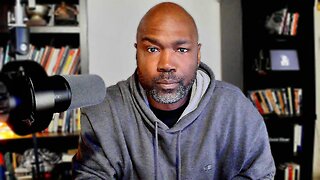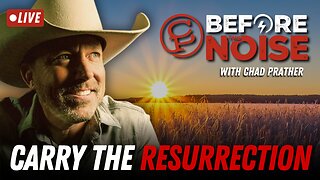Premium Only Content

DUC– Delineating Blackness: Identity, Truth, and the Real Talk
Welcome back to Da Urban Conservative, where we don’t sugarcoat and we don’t dance around the truth. This is the space where culture, history, and reality collide. Today, we’re diving into something deep—something that shapes identity, conversations, and even policies: the delineation of Blackness in America. Yeah, we’re going there. Uncut. Unfiltered. Let’s talk about what it means to be Black, African American, or something else entirely in today’s world.
So, let’s start with the basics. What’s delineation? It’s a fancy word for outlining something, for putting down the lines that define or represent. But here’s the thing: when it comes to identity—especially Black identity—those lines aren’t always clear. Who’s drawing them? Why? And what do they mean for us?
Let’s break it down.
When we talk about Black in America, it’s not just about skin tone. It’s culture, history, and a shared experience that transcends borders. Black is broader than African American. Say it again: broader. Here’s the truth—someone could be born in Jamaica, move to the U.S., and identify as Black but not African American. Meanwhile, someone with roots in Ghana or Nigeria might prefer to say they’re African American because of where they’ve built their life.
And let’s not ignore the linguistic evolution. Why do we capitalize “Black”? Because it’s more than a color. It’s a collective identity, a shared history, a unifying culture. This isn’t about semantics; it’s about respect. About recognizing a people who’ve been written out, minimized, and ignored in too many spaces for too long.
But let’s keep it real—words matter, and the context they come from matters even more. Take the term “African American.” Back in the day, folks used “Afro-American” to emphasize the African connection, but over time, it shifted to African American. Why? It reflected a growing pride in heritage and an acknowledgment of where we came from. And let’s not forget, before all that, we were just labeled “Negroes” or “colored,” terms given to us, not chosen by us. Language evolves, and with it, so does how we see ourselves.
Now here’s where it gets tricky: scientific and academic spaces. When you’re pulling data or citing research, the language used in that data can reflect its time. If the study says “Negro,” you can’t just swap it for “Black” or “African American.” Context matters. Respect the data, but also respect the people it’s describing.
But let’s pause for a second. What does this all mean for us, for our conversations, and for how we navigate this world?
It means we need to be intentional. If you’re speaking to an audience or engaging in dialogue, don’t assume everyone identifies the same way. Ask. Listen. Learn. And understand that identity is personal, even when it’s political.
Think about the Jamaican immigrant who identifies as Black but doesn’t feel connected to the African American experience. Or the Ethiopian-born American who carries both the pride of their homeland and the struggle of being Black in the U.S. These aren’t contradictions—they’re layers.
And let me be clear no one’s identity should be boxed in by someone else’s understanding. You don’t get to decide who’s Black enough or African enough or American enough. Identity is as complex as we are as people.
So, as we wrap this up, here’s the takeaway! Blackness is not monolithic. African American doesn’t cover everyone. And the language we use should reflect that reality. Whether you’re in a conversation, on a panel, or filling out a damn form, think about the words you’re using and why you’re using them. Respect the layers.
Because at the end of the day, Blackness is more than a label—it’s history, culture, resilience, and pride. It’s the good, the bad, and the ugly of living in a world that’s constantly trying to define you, while you fight to define yourself.
You’ve been listening to Da Urban Conservative, where the truth doesn’t apologize. Hit me up with your thoughts, your stories, your truths. Until next time, stay woke, stay grounded, and most importantly, stay you
-
 LIVE
LIVE
Matt Kohrs
10 hours agoStock Market Squeeze: Gov'nt Shutdown Ends, Stimulus Checks & Breaking News || Live Day Trading
5,664 watching -
 LIVE
LIVE
LFA TV
13 hours agoLIVE & BREAKING NEWS! | MONDAY 11/10/25
3,584 watching -
 UPCOMING
UPCOMING
Caleb Hammer
1 hour agoI Confronted The Governor Of Michigan | Financial Audit
247 -
 LIVE
LIVE
Rethinking the Dollar
28 minutes agoMonday News Update: Dividend Checks, Gov't Shutdown & Silver
39 watching -
 UPCOMING
UPCOMING
The Big Mig™
2 hours agoInsider Trader Of The Year Award Goes To Nancy Pelosi
2017 -
 1:03:54
1:03:54
Graham Allen
2 hours agoIs the Shutdown FINALLY ending!?! What was the deal?? + 50 Years Mortgages, $2K checks and More!!
93.1K61 -
 LIVE
LIVE
Badlands Media
13 hours agoBadlands Daily: November 10, 2025
4,157 watching -
 LIVE
LIVE
Wendy Bell Radio
6 hours agoSchumer's Shutdown Ends With Democrats Getting Nothing
7,916 watching -
 1:07:40
1:07:40
Chad Prather
22 hours agoHow to Rise Again: Finding Life in the Garden of the Empty Tomb
69K42 -
 24:21
24:21
It’s the Final Round
10 hours ago $8.34 earnedNBA Best Bets & Player Props | Full Analysis & Predictions, FREE Today (Monday 11/10) Nov 10th
31.4K1